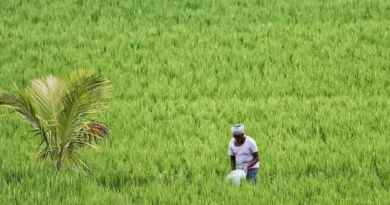
Fixing India’s Edible Oil Policy: From MSP Reform to Strategic Imports for 2047
08 October 2025, New Delhi: India’s edible oil policy has historically oscillated between protecting consumer prices and shielding farmer incomes, leaving systemic contradictions that exacerbate import dependence. As demand rises towards an estimated 46.5 million tonnes by 2047, policymakers must move beyond ad hoc tariff tinkering and build a coherent, long-term policy framework that reconciles trade, procurement and nutrition objectives. Midway through its opening analysis, the Kisan-Vigyan Foundation’s white paper Edible Oil – Strategising for 2047 highlights how short-termism in policy has widened the gap between aspiration and outcome.
Why policy must be strategic and predictable
Frequent import duty adjustments and sudden tariff changes have, over time, distorted domestic markets. At times refined imported oils have been cheaper than domestic crude after duty changes, undermining refiners and disincentivising domestic processing investment. For policy to be effective, predictability must replace reactivity. A dynamic duty mechanism linked to global price indices and a standing price stabilisation fund would allow targeted interventions without undermining farmer price signals.
MSPs, procurement and market credibility
The Minimum Support Price schedule (MSP) for 2025–26 shows increases across a range of oilseed crops. The reproduced table below includes growth percentages to aid policy calibration:
| CROP | MSP 2024-25 (₹/quintal) | MSP 2025-26 (₹/quintal) | INCREASE (₹) | GROWTH (%) |
| Nigerseed | 8,717 | 9,537 | 820 | 9.41 |
| Sesamum | 9,267 | 9,846 | 579 | 6.25 |
| Soybean (Yellow) | 4,892 | 5,328 | 436 | 8.91 |
| Sunflower Seed | 7,280 | 7,721 | 441 | 6.06 |
| Groundnut | 6,783 | 7,263 | 480 | 7.08 |
These figures underline that price signals are being strengthened; what is lacking is conversion of price policy into reliable procurement. Policy measures should therefore prioritise expanding procurement access and creating institutional mechanisms to ensure the declared MSP translates into realised prices for farmers.
Building a calibrated import strategy
Even under an ambitious domestic expansion, projections show a residual import requirement. Imports, therefore, must be managed strategically rather than treated as a problem to be eliminated. A diversified sourcing strategy, public–private import consortia for long-term contracting, and a modest strategic buffer stock of 2–3 million tonnes will reduce exposure to single-country shocks and provide breathing space for domestic scaling.
Policy must also incorporate public health considerations. Cheap, heavily refined palm oil dominates processed food supply chains and contributes to suboptimal nutritional profiles for consumers. Strengthening labelling laws, incentivising industry reformulation toward healthier domestic oils, and channelising indigenous oils through government nutrition programmes will align trade and health goals.
Institutional reforms and accountability
Policy success will depend on institutional redesign and clear delivery mechanisms. Digital traceability, upgraded state procurement infrastructure, targeted R&D funding and time-bound performance indicators for oilseed yield improvements should be combined with statutory arrangements that ensure inter-ministerial coordination. The Kisan-Vigyan Foundation’s white paper provides concrete institutional options and timelines; what is now required is policy commitment and transparent implementation.
Download the full white paper on Edible Oil – Strategising for 2047 here to explore the detailed data, scientific insights, and policy recommendations.
About Kisan-Vigyan Foundation
Kisan-Vigyan Foundation (KAKV) is a think-tank created to focus on Food & Feed Security of India and to support policies for the economic welfare of the farmers. The foundation has strong governing council members from core sectors of agriculture to work on fact-based research findings and to raise concerns where necessary.
📢 If You’re in Agriculture, Make Sure the Right People Hear Your Story.
From product launches to strategic announcements, Global Agriculture offers unmatched visibility across international agri-business markets. Connect with us at pr@global-agriculture.com to explore editorial and advertising opportunities that reach the right audience, worldwide.






